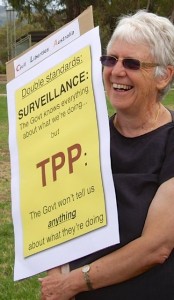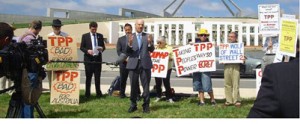A CLA demonstration at federal Parliament House has urged the government to open up TPP trade negotiations. Kelvin Thomson, Scott Ludlam and Peter Whish-Wilson spoke at the rally.CLA rally for open TPP is success
Report By CLa President Dr Kristine Klugman on the CLA-organised ‘Open up the TPP’ rally,
Tue 11 Feb 2014, at Parliament House Canberra
The first day of federal parliament sitting for 2014 saw a rally organised by Civil Liberties Australia to protest the TPP (Trans-Pacific Partnership) trade agreement.
As the banners variously and colorfully declared:
Save Our Sovereignty
Let the Australian people decide
Hold a referendum on the TPP
and

Double Standards – SURVEILLANCEThe Govt knows everything about what we’re doing…butTPP The Govt wont tell us anything about what they’re doing
Members of parliament expert on the trade agreement spoke. Labor Kelvin Thomson MP, who is deputy chair of the Joint Standing Committee on Treaties, the Greens Senator Scott Ludlam, who is also on that committee, and the Greens Senator Peter Whish-Wilson spoke. They were joined by the eloquent Humphrey McQueen, historian and social commentator and CLA member.
CLA’s CEO Bill Rowlings introduced the speakers and rounded out the protest rally with a call for a national referendum, and for all present to educate three friends of the implications for Australians of the TPP. He made the observation that the catfish farmers of the USA were protesting the TPP agreement in America because of the threat of imported catfish from Vietnam!
Speakers from the Liberal Party and the National Party were individually invited, but declined to attend. Media coverage was good: we expect to see CLA’s signs on national TV in the coming weeks, as debate ramps up on this ‘sleeper’ issue.
The message was that, in general, the TPP takes rights and liberties from the people of Australia, transferring them to big corporations. We lose sovereignty, they gain power and legal right to over-ride national laws.
Civil Liberties Australia is especially concerned about the lack of transparency and secrecy of the negotiations. Surely, at this stage, after more than five years of behind-closed-doors negotiations, the government can at least outline the broad parameters and come clean on what the implications are of the TPP for ordinary citizens of Australia.
If the Australian government agrees to the TPP, Australian society will be radically and suddenly transformed without the need for public discussion. Yet recent surveys show only about 1 in 10 Australians know this deal even exists, let alone its implications.
– Dr Kristine Klugman, President, Civil Liberties Australia

Why the TPP deal is wrong
Full text of a speech, partly given by CLA CEO Bill Rowlings at the ‘Open up the TPP rally’, Parliament House Canberra on 11 February 2014:
The Trans Pacific Partnership trade negotiations are wrong and disgraceful, because
- They hide information from the Australian people
…actively, Australian citizens are excluded from knowing what their government is doing.
(it’s worse than the problem of not being told about refugees and boats: at least Christmas Islanders and Indonesians can tell us what’s happening with refugee turn-backs and arrivals).
- The TPP will privilege big US, Japanese and world corporations over Australian businesses, and over the Australian people.
If governments and big business get together to negotiate in secret, you can be sure someone is being screwed…it won’t be them, so it must be citizens of the countries involved, including Australians.
- Secrecy is the opposite of good government, it is anti-democracy.
We are seeing this type of secrecy increasing with the Abbot government every day hiding basic information from us. But the TPP issue is not party-political: both Liberal and Labor support the agreement…even though it would appear to be to Australia’s disadvantage.
- Proponents of FTAs always say: FTAs create jobs in Australia….but they don’t.
If FTAs create jobs, let the proponents of this Trans Pacific Partnership demonstrate, with facts and figures, how the other FTAs we have with Asian countries have created jobs in Australia.
– particularly in manufacturing, particularly, in the car and components industry.
If Free Trade Agreements are the panacea for jobs, we should be putting on more people in South Australia, and in Victoria…instead of them getting pink slips saying that their jobs are disappearing to overseas plants.
We should be expanding fruit factories, to support our farmers, not closing them down.
If FTAs are so great, why is Australia being taken to court in Hong Kong by the international tobacco giant Philip Morris, to try to enforce Big Tobacco’s packet design and marketing rights over the rights and liberties and freedoms of the government and people of Australia to make laws for the better health of its citizens.
The Philip Morris case is the thin edge of the wedge: If the TPP goes ahead as proposed,
- Big Pharma will be taking the Australian govt to court over our subsidised medicines;
- Big Agriculture will haul Australia before the courts over GM produce, and products;
- Big Entertainment will drag Australia Into court to enforce copyright rules that are good for them…but bad for the Australian people.
- AND big overseas corporations will have more rights and liberties in Australia than Australian companies have in Australia.
They will be able to dictate terms to the Australian government…and of course Big Corporations will have more rights than Australian citizens, the forgotten people.
We, the Australian people, are not asking for much. All we want is for the Australian government to tell us what it is up to.
Before you complete your behind-closed-doors negotiations on this secret agreement, and
Before you sign secretly on the dotted line, committing the nation to an unseen trade pact:
A. Publish a copy of the draft for all Australia to see.
B. Allow discussion in the community and debate in Parliament:
- Undertake proper referrals through the Committee process,
- Allow open consultations and taking of submissions from people and businesses representing all sides, and, finally,
- Commit to a proper open debate in both houses of Parliament before a vote is taken.
C. If necessary, hold a referendum on this issue vital to all of us here, and to the next generations, and the ones after that.
All we asking is that you engage in open and transparent government.
In a democracy, that should not be too much to ask.
Bill Rowlings, CEO, Civil Liberties Australia
Rally, Parliament House, Canberra,
11 Feb 2014
HANDOUT: rally for an open TPP: Parliament House Canberra, 11 Feb 2104
Why keeps secrets from the Australian people?
Let’s free up public debate on the
Trans Pacific Partnership (TPP)
The TPP is a controversial and obsessively secretive “free trade” agreement currently being pushed by big corporations and negotiated behind closed doors by officials from the United States and a number of other nations.
They include Australia, Brunei, Canada, Chile, Japan, Malaysia, Mexico, New Zealand, Peru, Singapore, and Vietnam, with a couple of other countries about to join.
The agreement is more about increasing the power of foreign corporations than free trade. At the stroke of a pen, this deal could:
- Threaten internet access and impose stringent new copyright restrictions and penalties
- Lead to the privatisation of government services with favoured treatment for foreign corporations (including in socially sensitive services such as with Medicare)
- Push up the cost of pharmaceuticals by lengthening patents and decreasing access to generics
- Remove Australia’s sovereign right to decide our own social policy, such as having plain packaging on cigarettes
- Shed even more Australian jobs in the manufacturing and other sectors.
- Reduce wages and further weaken union power to work for better wages and conditions
- Prohibit banking regulations which protected Australian depositors during the Global Financial Crisis
- Ban “Buy Australian” policies needed to create green jobs
- Restrict labelling information on food products
- Ban labelling of Genetically-Modified produce and products
- Empower corporations to attack environmental and health and safety standards
- Restrict social welfare legislation
- Reduce government oversight of environmental effects of fracking and other kinds of mining
- Weaken regulation of agricultural toxins and pesticides
- Restrict government regulation of foreign ownership of land and other assets
In general, the TPP takes rights and liberties from the people of Australia, transferring them to big corporations. We lose sovereignty; they gain power and legal right to over-ride national laws.
In addition, the TPP contains a provision allowing foreign corporations to sue Australia (i.e. taxpayers) for millions of dollars in special foreign courts for any legislation, regulation or policy which affects or may affect their profits. For example, after losing their case twice in Australian courts, Philip Morris is currently suing the Australian Government over plain packaging using a foreign court under the provisions of 1993 treaty with Hong Kong, similar to those planned for the TPP).
The provision is known as Investor State Dispute Settlement (ISDS). There is no appeal against the decisions of these courts. The United States is pushing for all signatories to agree to this provision.
If the Australian government agrees to the TPP, Australian society will be radically and suddenly transformed without the need for a referendum or even public discussion. Yet a recent survey by the Australia Institute showed that only about 1 in 10 Australians know this deal even exists or is in the pipeline.
– research by Pauline Westwood


Christian Edwards liked this on Facebook.
Daniel Carr liked this on Facebook.
Tony Moritz liked this on Facebook.